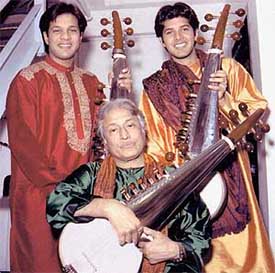Ustad Amjad Ali Khan
"After 9/11 and the Gujarat riots I feel ashamed to belong to the human race."
The sensitive fingers caress the silver strings; a shower of magical notes intoxicates the enraptured audience; music comes alive when strummed by Ustad Amjad Ali Khan.
Amjad Ali Khan's great grandfather Ghulam Bandagi Khan Bangash, a soldier of fortune, came from Afghanistan with the instrument rabab and was inducted into the army of the maharaja of Rewa. The king was so impressed by his son Ghulam Ali's talent that he took him under his wing. Ghulam Ali was trained under Ustads Pyare Khan and Jafar Khan Saheb, both rabab players and direct descendants of Mian Tansen. Soon Amjad's grandfather Nanhe Khan and father Hafiz Ali Khan, continued the family legacy of the dhrupad and rabibiya tradition and kept improving and altering the rabab, until it became the modern Sarod. Although his brothers were taught with the same sincerity, it is Amjad the youngest child, who emerged as a maestro. Now celebrating his 50th year in music, the legendary Sarod maestro, (who is also one of the most decorated musicians with awards and honors that include the Padmashri, and Padma Bhushan) sat down for an exclusive interview.
You started at a very young age, so were you also a child prodigy?
I was certainly not a child prodigy. My father was 65 when I was born and being the youngest, I was loved and treated gently, but I did work very hard. I started learning the Sarod at the age of five but my perception of music had already developed by three. I have learnt vocal music and tabla as well. I started performing in concerts at the age of 10, and began by playing the tamboora as accompaniment to my father and gradually learnt the various techniques of stage performance-how to sit on stage, how to communicate with fellow musicians.
I got my first big break as a child at the age of 11 in Calcutta at the traditional Sadarang Music conference along with my father and other illustrious musicians. I played the raga "Gujri todi" with the famed tabla player Ustad Karamatullah Khan accompanying me. The response was overwhelming. By 12, I was a mature performer. I was also the first in my family to receive formal education-Modern school, Delhi being my alma mater. I was in my final year when I left to accompany a troupe of musicians to the US and never looked back.
What were the most important lessons learnt from your father and what kind of a musician are you?
My father believed in the necessity of preserving the ancient purity of ragas and raginis. He imbibed in me the belief that more than anything else, music was a form of prayer glorifying one's maker and hence pure music must never be defiled. I feel embarrassed to say Indian classical music is my profession. It is a passion, worship and a way of life and just merely playing good music does not make you a complete musician or a true representative of the tradition. Our tradition is based on spirituality, trust, faith and religion. My father said we should always be the cause of happiness for others and never of sorrow or humiliation. He did encourage me to make my own innovations but only by using the various intricate techniques of bol and taan as my solid base.
For me each raga is a human entity. It has a soul and whenever I hit a wrong note my father would instantly say, son be careful, be sensitive and tender, don't injure the raga, and don't cause it pain for it can curse you. A raga has to be invoked by coaxing and cajoling it into awakening. Each time one plays the mood and the beauty of the raga is unique and cannot be replicated even though in books for the purpose of giving you a degree they will attribute a fixed mood to a raga. One raga can emote so many different emotions. That is why I can never reproduce what I have played in the exact same way. I experiment constantly. For instance, in my rendition, Trimurti, three different ragas were juggled together-alaap in Tilak Kamod, Kalavati intervening and Hansdhwani at the conclusion. I want to make the ragas talk with each other, and there is nothing wrong with experimenting and innovating with our own tradition.
I myself have a very inquisitive musical mind. I believe that ragas are not static. So my recitals, though traditional in style, are very modern in approach. One thing that used to irk me deeply was the technical limitations of Sarod as an instrument. Consequently, I have worked hard to enrich its range and capacity. I also introduced khayal into Sarod playing, at a time when dhrupad was the basic style adopted by all Sarod players, including my father and reoriented the traditional baaj of Sarod.
Tell me about your mother.
No matter who you are, a great musician, a great political figure, a great spiritualist, or just the every day person, your mother is your first guru and for me it was no different. Our home was always humming with people, not just members of our joint family, but also my father's disciples who lived with us as was the tradition in those days.
"My mother was a fabulous cook and to this day the delicious aroma of that food lingers in my memory. I would be practicing and every hour some thing or the other would be sent for me. It was as if all her love was captured in those delicacies. I was the youngest child from my father's second marriage to my mother after his first wife had passed away leaving two children who were fairly close to my mother in age.
Mother faced a lot of hostility as my father's younger brother was married to the sister of his late wife, but I never saw a trace of vindictiveness in her. Also for some reason my other cousins and siblings could not measure up to my father's expectations and he had pinned his hopes on me as the one who would carry on the family legacy, so I could not enjoy my childhood. Through it all the look of joy and pride in my mother's eyes as she encouraged me and reminded me of my father's hopes and dreams was what kept me going.
My mother was not a trained musician. As you know there was the purdah system, not just among Muslims but even the Hindu families and we didn't teach our daughters music. My mother however had a keen sense of music and there were times she came to a few of my concerts and was overwhelmed by the appreciation I was receiving. There were other moments when I would be practicing and suddenly I would play something intricate and her eyes would fill up with tears of joy, and blessings would pour from her lips in abundance.
I became the breadwinner for the family at a young age, and though circumstances would be financially tough at times, I never stopped my mother from her passion of helping others financially.
The ability to give and be compassionate was what bound my parents to each other and she was the one cooking and feeding and helping the underprivileged. The look of sheer joy when we stepped up and honored her wishes to help someone she had taken under her wing, made it an even greater joy for us. I find it strange when I see kids of today telling their parents not to waste their time and money on charitable causes.
My mother also taught me to never dishonor or disrespect anyone, to carry myself with dignity, try not to hurt anyone's feeling unintentionally and to treat everyone equally and respectfully. To this day I feel the presence of my parents around me and their blessings.
You have taught and played extensively all over the world. What are your thoughts on the audience and the students abroad and the way appreciation of Indian classical music has evolved here in the United States?
Whenever and wherever I taught in the world, my sole purpose was and remains to convey the message that in our music you can see and feel the freedom within the discipline. The improvisation is totally different from the way it is done in say jazz for instance. We have a very strict discipline of ascending and descending. Again in western music putting the notes on paper is very important because people write and read music. When I taught a credit course in the University of Chicago the faculty was expecting me to prepare and grade papers and write instructions on the blackboard, but I told the dean, I live in the world of sound. If you want documentation of my work and teaching you can make a video recording of the sessions, so the westerners know how I create my music and how I make others believe that music already resides in you. Every human being is born with sound and rhythm. A heartbeat is an indication of rhythm and what you speak and that may be conversation, recitation, chanting or singing, is all part of music.
The culture of western classical music is very strict and though I love western classical music, the symphony especially, it is limited by the fact that you only play what you see written before you on a piece of paper.
Our music is very spontaneous and natural. I am often singing spontaneously and I even forget at times where I am. I still remember I was once at a store standing in a queue in Europe and started humming a raga, without realizing that I was in a public place in line and that a little old lady was standing in front of poor lady's ear and me was right next to my mouth. I kept on singing oblivious of my surroundings and after a long time of suffering she finally turned around and said please STOP singing!
Sarod awareness is better now but Sitar has had an advantage because of the Beatles in the 1960s but now things have picked up from mid 1980s. In fact in 1984, I was traveling in America and 20th April was declared "Amjad Ali Khan Day". The American Hindustani vocalist Warren Senders had arranged the concert. Warren is a bigger Indian than all of us Indians- an amazing man, an amazing artist. This is the peak time of Indian classical music all over the world and I think people are really seriously into it.
What surprises the audience abroad, about Indian classical music is that there is no notation and that during the solo performance the conductor, performer and composer is one person.
Your father sang as he taught you, and you sing as well, so unlike some of the other master musicians why have you not incorporated the Gayaki ang, where the artist sings as he performs, in your repertoire?
Indeed my father sang and sang beautifully and so do I, but I feel Gayaki ang is a limited thing. You have to always explain what you are singing. Is it dhrupad or khayal, or thumri or dadara? I don't use the word "gayaki ang" but I say I sing through my instrument. Music is of two types - pure sound, which is healthier, and more natural. Instrumentalists all over the world live in the world of sound and are not limited by text. The other music is based on literature, stories, and lyrics but there is an old saying that language creates barriers. Music is often vulnerable to being labeled cheap because of the words or called devotional for the same reason even though the notes may be the same in each song.
I feel the purest form of music is the one, which has no words and that is kind of the music, which connects the world. It has immense health benefits as well. If you listen with concentration it is more effective than even yoga. In fact today there are some religious spiritualists who are involved in a research project in an Ashram in Mysore as to which raga heals a particular ailment.
Both your sons Amaan and Ayaan are following in your footsteps and not just in music but they are also incredibly humble and affectionate. What have you taught them as a musician and a father?
That classical music involves years of practice and prayer, and that there are other ways of making quick money for those who want short cuts to achieving their goals. By the grace of god Amaan and Ayaan are very hard working boys, compassionate and respectful and my wife and I have always wanted that they become good human beings and represent the true Indian culture by being graceful, humble and gracious and become role models for the young generation. At the same time we have not forced them to be Sarodiyas and not develop other interests or other areas of their personality. They were asked to sing at the popular television program" Saregama" and I said fine, if you think you want to give it a try go ahead. Till then they had never sung a film song in the house. So they went to Bombay and started recording.
Two years later they themselves realized that their goal was not play back singing, and that first and foremost they are Sarod players. They have had offers for modeling and acting in films. Ayaan is a prolific painter and has held an exhibition of his paintings. My wife and I have never stopped them from experimenting with any thing. We have given them freedom of expression, of religion and music. From childhood they were allowed to listen to any musician they wanted to listen to. There are some musical families where the musicians are fundamentalists in every way .
They were very fortunate that I could give them a lot of time and I was much younger than my father when he started teaching me. I never forced anything on them nor were they punished, as per the stories of strict gurus that one has heard so often. In hindsight I feel that was a very inhuman way of teaching. Amaan and Ayaan came here with me for the first time in 1991 when they were 14 and 12, and the gulf war was on. We flew in an aircraft that was totally empty. I was invited by the Asian society, and performed for 4 days and the last item used to be where the three of us played together. They received a standing ovation and a big write up in New York Times. They continue to work very hard.
I have told them that sarod is not going to bring them instant acclaim and gratification. Their focus should be to work hard and conduct themselves with dignity and humility. Although seeing the kind of noisy discordant sounds they call music that has flooded the music space globally today, if Amaan and Ayaan are classical musicians its nothing to do with me..it's a miracle of God!
You have performed duets with western and Asian artists. What do you think about fusion music?
With all due respect to all kind of music especially fusion, noisy music is injurious to the health, and it does damage your sensitive cells! Listen to any music of the world, but unless it is soothing its unlikely you will receive the positive effects of that kind of music. Fusion is a momentary pleasure, almost like flirtation but you cannot produce a legitimate child out of it. Both the western and Indian traditions are so strong character wise that it is impossible to mingle the two and create a third tradition out of it.
I think if you can improvise and remain within the tradition of your gharana it would be great, but today unfortunately we have three gharanas-radio television and cd gharanas..People copy and learn from TV and radio. The honest ones acknowledge where they picked up the stuff from others don't.
What are your thoughts about Ravi Shankar and Vilayat Khan? You paid homage to Vilayat Khan sahib when he passed away and that created quite a furor within the family itself, where Imrat Khan sahib felt you didn't give him the credit he deserved as a worthy successor of Vilayat Khan sahib.
Let me say this Vilayat Khan was such a gifted musician and yet he was humble enough to always say he belonged to the Imdadkhani gharana, long after his talent had surpassed what his gharana represented and long after he became the gharana himself. Yet not once did he claim to be larger than his roots. That is all I said, and unfortunately that was taken out of context.
As far as Ravi Shankar is concerned, my greatest admiration for him stems from the fact that here is a man who had no gharana to talk about. His father was not a musician, his guru's father was not a musician. On top of that his guru was a sarod player. Look at the odds he beat to become the extraordinary musician he became. His contribution in putting Indian classical music on the map is so obvious and so well documented that I'm surprised when I hear any one saying to the contrary. He is truly a self made musician and he deserves every accolade that has come his way.
So do we expect a concerto for Sarod from Ustad Amjad Ali Khan?
Why not? I'm open to it. My sons have performed with the cello player Matthew Barley. My only problem is I don't write and will have to get someone to write the music for me. Let's see when an opportunity arises.
You have created so many ragas and you dedicated one "Raga Subhalakshmi" to your wife Subhalakshmi, surprising her on her birthday? How did that happen? And what other personal favorites do you have?
I guess I have composed 30-40 ragas in all though I feel embarrassed in saying I composed these ragas. Let's just say I discovered them. I would find myself humming in solitude and then suddenly realize its something new and unique and I would give it a name. I think apart from our love for each other, I saw how my wife sacrificed her identity and a stellar bharatnatyam career so that she could be there for my sons and me. That inspired me to compose a raga in her name. My other two favorites are my recent compositions rag Hafiz and Rahat Kauns dedicated to my father and mother.
You were honored last year with the 15th Fukuoka Asian Culture Award. What does that mean to you?
It brings home the fact that music has no boundaries and no religion. It is the binding force in the world. After September 11 and the Gujarat riots I feel ashamed to belong to the human race. Even animals attack one prey at a time and only when they are hungry or feel threatened. Man has become the most dangerous animal on this planet-a symbol of hatred, and religion is being bashed in the process. There is no religion in the world that supports this kind of hatred and violence. As a musician I feel connected to every soul in the world and I hope that we can use the healing power of music to bring harmony in the world. The same 12 notes bind all music. No one has come up with the 13th note. As a humble citizen of the world I want to appeal to everyone to remember that humanity is the only true religion. God does not reside in the concrete buildings around us but within us..atma hi parmatama hai..so please let that godliness within you emerge and create a peaceful and harmonious world for future generations.
Amaan and Ayaan recently came up with a very honest book about you. They have spoken about certain personal things very candidly What did you think about it?
I think they are at an age where they felt they wanted to share my life with others. I have to say I did not interfere but did wonder what they will come up with. I have to admit that they have written everything with great dignity and respectfully.
When you look back, what is it you are happiest about, and what remains still to be achieved?
The greatest satisfaction is that in each young Sarod player in India, there is an Amjad Ali Khan hidden somewhere. They may be disciples of any musician but the love that I feel emanating from them for me is amazing. It's the greatest feeling. As musicians our bank balance is love and not monetary satisfaction. Today people hear us, and their love inspires us to greater heights. I love to perform with my sons. When the three of us play together its like a living tradition alive on stage and a unique experience for people. For me its a matter of pride to play with the youngsters, Sarod is such a beautiful instrument, and in spite of having made so many new innovations I feel even now that I have not done full justice to it. There are so many nuances, so many variations and subjects, which till today I cannot attempt. Its all in my mind but my hands are not ready yet to give concrete shape to all that I m thinking of, and so I shall keep on delving in to this vast ocean for the pearls that still lie unclaimed within its depths. For the audience, this is entertainment, for the artist, this is his life.
Edited by Chalavanth - 18 years ago
























